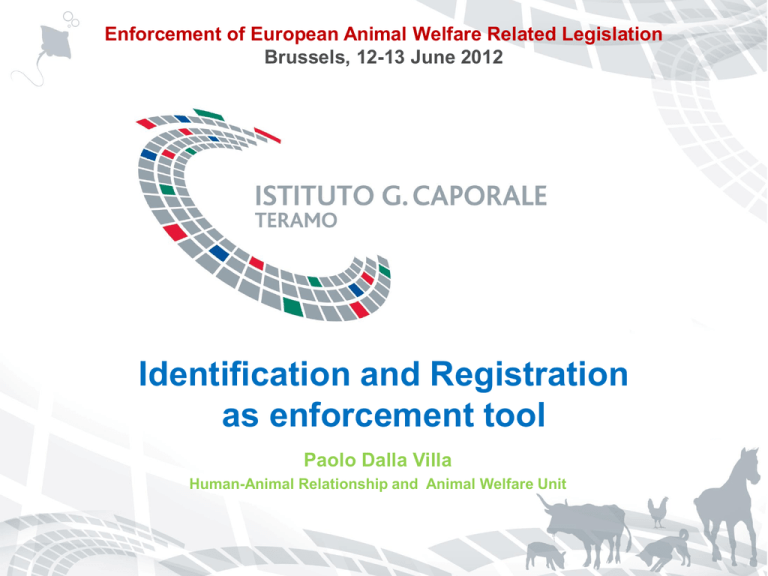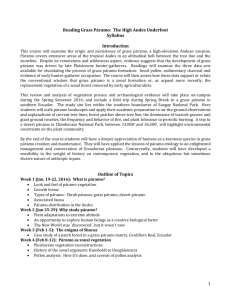
Enforcement of European Animal Welfare Related Legislation
Brussels, 12-13 June 2012
Identification and Registration
as enforcement tool
Paolo Dalla Villa
Human-Animal Relationship and Animal Welfare Unit
The Istituto G.Caporale main
Fields of Activity
Animal Health and
Welfare
Food safety
Public health and
environment
Epidemiological
surveillance
Animal I&R and information
systems
Training & education
EU animal ID and R framework
• Directive 2008/71/EC on pig identification and registration (ex92/102/EEC)
• Regulation (EC) 1760/2000 on bovine identification and registration
• Regulation (EC) 21/2004 on ovine and caprine identification and
registration
EU animal traceability ;
• Individual identification of animals
• On farm registers
• National databases (fully operational)
• Passports
• Electronic identification
• TRACES Intra-EU trade
• Inter-operability of bovine databases (BOVEX pilot)
Animal identification and animal traceability are tools for
addressing animal health (including zoonoses).
These tools may significantly improve the effectiveness
of activities such as: the management of disease
outbreaks (..), vaccination programmes, (..), disease
surveillance, early response and notification systems,
animal movement controls (..).
2011 ©OIE - Terrestrial Animal Health Code
Traceability
“ABILITY TO TRACE THE HISTORY, APPLICATION, OR LOCATION
OF AN ENTITY BY MEANS OF RECORDED IDENTIFICATIONS”
(US Environmental Protection Agency)
Registering the premises
Identifying the animals
Recording their movements
FACTORS INFLUENCING EMERGENCE AND REEMERGENCE OF ANIMAL DISEASES(*)
(*) Data from a worldwide OIE survey among Chief Veterinary Officers in 2004
Dog I&R, a basic tool
• To ensure animal traceability, recording up-to-date
movements (from birth to death);
• To provide data and information about dog population
structure and composition;
• To prevent the negative effects of dog overpopulation
on public health, animal health and welfare (stray
animals);
• To minimize the societal costs of dog irresponsible
ownership.
Istituto G. Caporale - Teramo
Is dog identification mandatory?
(Tatoo or Chip)
YES
Austria; Hungary;
Bulgaria; Croatia;
France; Portugal;
Serbia; Spain;
Switzerland;
www.carodog.eu National Legislation and Standards
NO
Finland;
Germany;
Lithuania;
PARTLY
Netherlands
Existing Databases for companion animals
Austria: public data base for the registration of dogs; although chipping
and registration are obligatory since 30th June 2009 the data base was
installed only recently.
Hungary: there are not exact registration databases for companion animals,
the MAOK (Hungarian Veterinary Chamber) has a database, which contains
the immunized dogs.
Bulgaria: private and public databases, the public exists since 2010.
Croatia: Central Veterinary Information System (CVIS).
Finland: there are databases run by breeders associations, a browser
run by the largest AW association in Finland in co-operation with several
partners.
France: public, FICADO for dogs and SIEV for cats.
www.carodog.eu
Lithuania: Several Registration databases are managed by
municipalities (no public access).
Portugal: There are two registration databases, public SICAFE (Sistema
de Identificação de Caninos e Felinos), and the veterinarian’s union
database SIRA (Sistema de Identificação e Registo de Animais).
Serbia: One public central registration database.
Spain: public, each one of the Autonomous communities The Database
Derecho Animal, contains the legislation for each Autonomous Community.
Switzerland: ANIS is the private national database for registered dogs
and cats.
Netherlands: Several private databases
www.carodog.eu
FVE SURVEY on Identification of pets
What is the percentage of pets identified in your Country?
Dogs 5 – 90 % (average 50%)
Cats 0 – 40 % (average 10%)
Ferrets 0 - 10%
Marc Buchet FVE – Teramo CAROdog Workshop I&R , 2011
What about Germany?
• According to a survey from TASSO the average
an animals shelter pays for 1 day for 1 animal is
about 14 EUR.
• If a animal is not registered, the average waiting
time, until the owners picks up his pet is 12
days.
• So an not registered animal produces average
costs of 168 EUR per stay in the shelter
Philip McCreight TASSO – CAROdog Workshop I&R - Teramo , 2011
What does I&R in Germany save the
shelters and municipalities
• By re-uniting 55.000 pets and owners a year the
economic benefit sums up to 9,3 Million EUR a
year.
• The registration of all dogs could save
municipalities and animal shelters up to 20
Million EUR a year only in Germany
Philip McCreight TASSO – CAROdog Workshop I&R - Teramo , 2011
In 1991 Italy abandoned the
“catch and kill” policy
A national framework law was released for “ the protection of
pets and the prevention of animal abandonment”:
All dogs must be individually identified and
registered by Local Veterinary Services;
Responsible ownership concepts must be promoted
by the Competent Authorities;
Killing captured dogs is forbidden unless they are
“seriously or incurably ill or proven to be dangerous”;
Captured dogs, if not reunited to the owner, have to
be neutered, identified and kept for adoption in a
public long term shelter.
Ministry of Health Ordinance, 2008
In order to:
achieve an uniform application of the canine I&R at national level
register and identify the biggest number of animals in the shortest time
strengthen the stray dog population control measure
prevent animal abandonment
minimize the risk of zoonosis transmission, dog aggressions episodes, public
& economic loos for framers/breeders (compensation)
nuisance
control the animal movement
•
•
•
•
Official Vets and “accreditated” Private Practitoners shall register dogs within 2 months of age
An National Information System should dialogue with the 21 Regional Database systems
Microchip producers and distributors should be registered at the Ministry of Health (assigning
numerical series of electronic codes)
microchips could be only sold to Regional CAs, Local Health Units, “accreditated” Private Vets and
Faculties of Veterinary Medicine
Annual report of Verona city dog shelter:
prevalence of microchip on abandoned dogs
1200
1000
800
Micro-chipped
600
Non micro-chipped
400
200
0
2006
2007
2008
2009
2010
Source : Verona Local Veterinary Services
Currently in Italy
Each region hosts its own dog registry, and these
registers are not compatible amongst them.
The recorded data are transferred to the national level,
sending files in batch mode
Main problems:
Up-to-date traceability is only at regional level;
The national database is only a list of dog codes (not a full I&R system);
Only few information are recorded at national level (code, sex, race, date of birth)
Istituto G. Caporale - Teramo
THE ICT application architecture
File upload
Web interface
Web users
File download
Web services
Tablets and smartphone
Istituto G. Caporale - Teramo
Other already existing
applications can exchange
data in real time, reading and
writing information from/into
the dog I&R system
SMS notification
The SMS notification services allows to receive the
dogs’ file card simply texting the microchip code to a
green number
Istituto G. Caporale - Teramo
Ongoing improvements
• integration of health data in the dog file;
• development of an alert system on shelter
capacity;
• development of application for low-cost mobile
devices (smartphone, tablets) that, connected
with reader and using web services, can query
the system and retrieve dogs’ file card and other
relevant information in real time from field;
• broadening the I&R system to other pet
species (cats and ferrets).
Istituto G. Caporale - Teramo
The ICT proposal, an efficient and costs
saving Information System
• By ensuring data exchange in real time
from regional to national level;
• By guaranteeing a complete and updated
traceability at national level;
• By allowing different existing application to
exchange data without changing the preexisting platform or user interface.
EU Animal Welfare Strategy
2012-2015
• A non-legislative initiative
• Better compliance, enforcement of the
existing legislation
• Pet animals included -> Study on the
welfare of dogs and cats involved in
commercial practices (2014)
Take home message……
Enforcement of laws
will not, on its own,
result in lasting,
voluntary changes in
behaviour,it needs to
be supplemented by a
range of nonregulatory approaches








